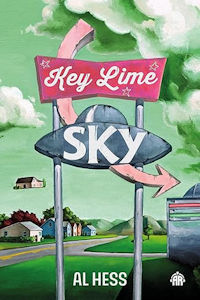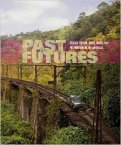Key Lime Sky by Al Hess: Review by Paul Di Filippo
 Key Lime Sky, Al Hess (Angry Robot 978-1915998125, trade paperback, 304pp, $18.99) August 2024,
Key Lime Sky, Al Hess (Angry Robot 978-1915998125, trade paperback, 304pp, $18.99) August 2024,
It has been said that Irish fantasist Flann O’Brien had a penchant for involving the humble bicycle in his surreal fiction, until the vehicle became a kind of numinous totem or idiosyncratic symbol. A few other writers of fantasy have deployed such a technique—recurring enigmatic touchstone with multiple meanings—and now Al Hess joins their ranks, with his pie-centric tale. (I am not sure if I should mention that his fellow fantasist who uses the pen name Uncle River actually lives in Pie Town, New Mexico, for fear of conjuring up more synchronicity.)
Hess’s story is generally funny and light-hearted with a substratum (or carapace?) of seriousness and tragedy. It reads with a flowing smoothness that sucks one into the events. It features characters who chart off the center of the conventionality spectrum. And it plays fast and loose and giddily with various respected SF tropes, much in the manner of a Rudy Rucker novel.
Taken at surface level, it’s an alien invasion novel mixed with a gay rom-com. Not an everyday combination, but a winning one. Digging a little deeper, it’s a meditation on how society deals with outsiders; on one’s debt to one’s fellows; and on how to live a satisfying and productive life without hurting anyone. A pretty potent package masquerading as “flying saucer rock n’ roll.”
Denver Bryant—a high-functioning, nonbinary soul, who’s not picky about pronouns, so let’s use “they/them”—lives alone in Muddy Gap, Wyoming, a tiny town of 800 folks. A loner and claustrophile, they make a scant living with blog posts and online product reviews, thus allowing them to interact face to face with as few real-life people as possible. That’s a plus for Denver’s proclivities. Oh, yes, one of their fave products to review is pie, and they have a connoisseur’s vocabulary and expertise on the subject, earning them the not-always-well-meaning nickname of “Professor Pie.”
The time is the near future, which differs not overly from our present, save for such neat gadgets as augmented-reality contact lenses.
One day Denver and some other townspeople see what appears to be a UFO crash. At first, nothing much happens. But then the Fortean weirdness begins to accumulate. Rains of tiny “extradimensional hermit crabs” as well as storms of alien orange sand. So far, so creepy. But the worst is yet to come. The citizens of Muddy Gap start to become diminished versions of their own personalities, violent and uncomprehending.
Along this journey of oddness, Denver meets Ezra, a somewhat hunky bartender with a sharp wit and comic nature. Ezra does not seem to mind Denver’s mannerisms, and a bond of affection builds up. It’s reinforced by the fact that the two of them seem immune to the brain plague, as do a few other denizens.
Eventually, the weirdness mounts until Denver and Ezra feel forced to flee the town for help. Too late. A cordon of spacetime confusion has been placed around the town. They have to retreat.
Now things begin to worsen, as spacetime elsewhere in the town begins to fracture. Nothing like having the front of your apartment building sheared off. Even worse, a few other non-affected folks want to play survivalist. But Denver and Ezra remained focused on logical problem solving, and eventual conquest of the alien presence responsible for all the chaos. But can they stop the invasion with a couple of kitchen knives, bravery, and a smashed peanut-butter pie?
The tale is narrated by Denver in an effective and affecting voice, and, through them, Hess conjures up an empathetic portrait of a neurodivergent champion, a picture neither fawning and exculpatory nor othering and smothering. Just as with any fully rounded person on a page, Denver emerges as “merely” another one of us quirky, unique homo sapiens. Ezra gets nearly equal screentime and development—the backstories of both of them are well-woven—and the supporting cast—including survivalist Molly and Denver’s frat bro of a neighbor, Trevor—brighten the page as well.
There are echoes of both The Midwich Cuckoos and The Body Snatchers here, as well as some flavors from The Puppet Masters. Less obvious but still present, at least to my eyes, is some Simakian spacetime-contorting fun, as seen in “The Big Front Yard”. But whereas Simak’s view of alien contact was generally favorable and friendly, Hess’s take is decidedly antagonistic.
Hess’s latest novel—he’s published a rich handful of others—is something like a low-key Independence Day, with pie-fueled courage taking the place of a killer computer virus.
Interested in this title? Your purchase through the links below brings us a small amount of affiliate income and helps us keep doing all the reviews you love to read!
 While you are here, please take a moment to support Locus with a one-time or recurring donation. We rely on reader donations to keep the magazine and site going, and would like to keep the site paywall free, but WE NEED YOUR FINANCIAL SUPPORT to continue quality coverage of the science fiction and fantasy field.
While you are here, please take a moment to support Locus with a one-time or recurring donation. We rely on reader donations to keep the magazine and site going, and would like to keep the site paywall free, but WE NEED YOUR FINANCIAL SUPPORT to continue quality coverage of the science fiction and fantasy field.
©Locus Magazine. Copyrighted material may not be republished without permission of LSFF.









